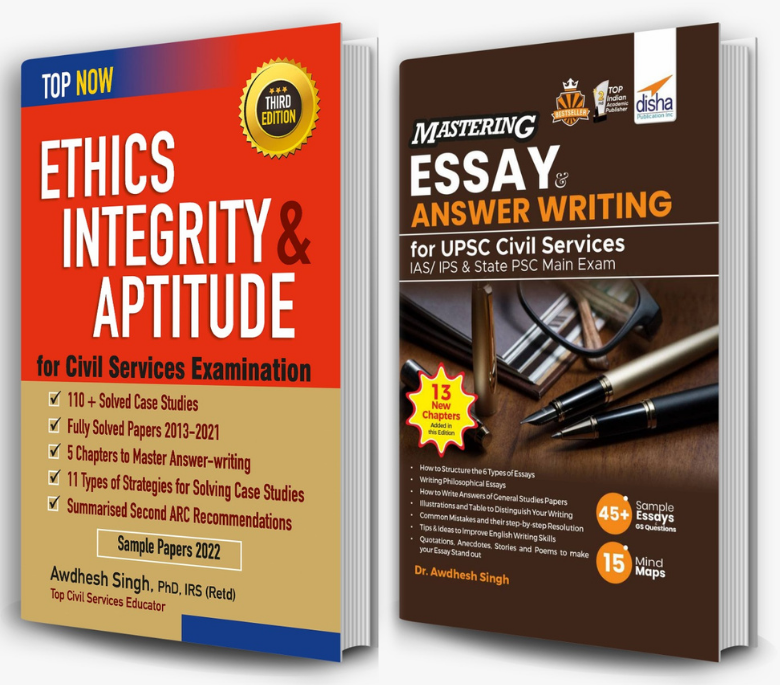Solved Ethics Papers
Topics
All
Civil Services in India (26)
Ethics, Integrity and Aptitude
» Chapters from Book (11)
» Case Studies (8)
Solved Ethics Papers
» CSE - 2013 (18)
» CSE - 2014 (19)
» CSE - 2015 (17)
» CSE - 2016 (18)
» CSE - 2017 (19)
» CSE - 2018 (19)
» CSE - 2019 (19)
» CSE - 2020 (19)
» CSE - 2021 (19)
» CSE -2022 (17)
» CSE-2023 (17)
Essay and Answer Writing
» Quotes (34)
» Moral Stories (18)
» Anecdotes (11)
» Beautiful Poems (10)
» Chapters from Book (5)
» UPSC Essays (40)
» Model Essays (38)
» Research and Studies (4)
Economics (NCERT) Notes
» Class IX (14)
» Class X (16)
» Class XI (55)
» Class XII (53)
Economics Current (51)
International Affairs (20)
Polity and Governance (61)
Misc (77)
Select Topic »

Civil Services in India (26)
Ethics, Integrity and Aptitude (-)
» Chapters from Book (11)
» Case Studies (8)
Solved Ethics Papers (-)
» CSE - 2013 (18)
» CSE - 2014 (19)
» CSE - 2015 (17)
» CSE - 2016 (18)
» CSE - 2017 (19)
» CSE - 2018 (19)
» CSE - 2019 (19)
» CSE - 2020 (19)
» CSE - 2021 (19)
» CSE -2022 (17)
» CSE-2023 (17)
Essay and Answer Writing (-)
» Quotes (34)
» Moral Stories (18)
» Anecdotes (11)
» Beautiful Poems (10)
» Chapters from Book (5)
» UPSC Essays (40)
» Model Essays (38)
» Research and Studies (4)
Economics (NCERT) Notes (-)
» Class IX (14)
» Class X (16)
» Class XI (55)
» Class XII (53)
Economics Current (51)
International Affairs (20)
Polity and Governance (61)
Misc (77)

Q10. Responsibility of a Hospital Administrators during Covid-19
Question
The coronavirus disease (COVID-19) pandemic has quickly spread to various countries. As of May 8th, 2020, in India 56342 positive cases of corona had been reported. India with a population of more than 1.35 billion had difficulty in controlling the transmission of coronavirus among its population. Multiple strategies became necessary to handle this outbreak. The Ministry of Health and Family Welfare of India raised awareness about this outbreak and to take all necessary actions to control the spread of COVID -19. Indian government implemented a 55-day lockdown throughout the country to reduce the transmission of the virus. Schools and colleges had shifted to alternative modes of teaching-learning-evaluation and certification. Online mode became popular during these days.
India was not prepared for a sudden onslaught of such a crisis due to limited infrastructure in terms of human resources, money and other facilities needed for taking care of this situation. This disease did not spare anybody irrespective of caste, creed, religion on one hand and ‘have and have not’ on the other. Deficiencies in hospital beds, oxygen cylinders, ambulances, hospital staff and crematorium were the most crucial aspects.
You are a hospital administrator in a public hospital at the time when coronavirus had attacked a large number of people and patients were pouring into the hospital day in and day out.
a) What are your criteria and justification for putting your clinical and non-clinical staff to attend to the patients knowing fully well that it is a highly infectious disease and resources and infrastructure are limited?
b) If yours is a private hospital, whether your jurisdiction and decision would remain the same as that of a public hospital? (Answer in 250 words)
Answer
(a) As the public hospital administrator, I will ensure that the resources of the hospitals benefit the largest number of people, particularly the poorer sections of society who can’t afford medical treatment in private hospitals. The hospital staff must save the life of the patients in the time of such a crisis.
Since Covid 19 is a highly infectious disease, it is my duty to protect the clinical and non-clinical staff from infection. The public hospitals have limited staff. If they get infected, not only do they and their family face the risk of life, but they, along with all the contact persons, have to be quarantined, which will reduce the availability of staff in the hospital and put the remaining staff under severe pressure. Hence, I will ensure that all healthcare staff is trained in washing hands, maintaining social distancing, and wearing proper masks and PPE kits all the time. I will also ensure the appropriate disposal of PPE kits and bio-medical waste management.
(b) If I am the administrator of a private hospital, I will take the same steps to prevent covid infection among the staff and the patients. However, the patients who can afford to pay for the treatment or have the proper insurance policy has to be given preference. However, I will also ensure that even poor and critical patients are also taken care of by the hospital. For this purpose, I will ensure a part of the hospital facilities and beds are reserved for such Covid patients. Furthermore, I will try to involve the NGOs and use public health insurance schemes like Ayushman Bharat to help the poor and critical patients. (276 words)

Looking for a One-stop Solution to prepare for ‘Ethics, Integrity, and Aptitude’ and ‘Essay and Answer Writing’ for UPSC?
Buy Dr. Awdhesh Singh’s books from the links below-
Buy Dr. Awdhesh Singh’s books from the links below-
Ethics, Integrity & Aptitude for Civil Services Examination
Amazon - https://amzn.to/3s1Qz7v
Flipkart - https://bit.ly/358N2uY
Mastering Essay & Answer Writing for UPSC Civil Services
Amazon - https://amzn.to/3JELE2h
Flipkart - https://bit.ly/3gVIwmv
| Related Articles |
| Recent Articles |
